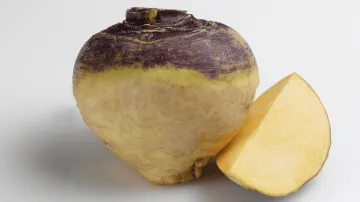Nestled in the realm of root vegetables lies a golden gem often overlooked in the pantheon of superfoods: the yellow turnip, affectionately known as Swede. Originating in Northern Europe, particularly in regions like Sweden and Scotland, this humble vegetable has a rich history dating back centuries. Believed to have been cultivated since the Roman era, Swedes have traversed through time, becoming a staple in cuisines around the world. While it may not always enjoy the same level of attention as kale or quinoa, this underrated vegetable packs a punch when it comes to nutritional value. Here are five compelling reasons to incorporate more yellow turnip into your diet
Nutrient-rich profile:
Swedes are a dense source of essential vitamins and minerals, making them a valuable addition to any balanced diet. They are particularly rich in vitamin C, which supports immune function and promotes collagen synthesis for healthy skin. Additionally, yellow turnips contain significant amounts of vitamin K, vital for bone health and blood clotting, as well as vitamin A, important for vision and skin health.
Helps in weight loss:
If you're watching your weight, swede can be a valuable ally. With its low-calorie and high-fibre content, yellow turnip helps promote feelings of fullness and satiety, making it an excellent addition to meals for those looking to manage their weight. Its high water content also aids in hydration and contributes to a sense of fullness without adding excess calories.
Boosts immunity:
The high vitamin C content in swede makes it a valuable ally for your immune system. Vitamin C helps your body produce white blood cells, which are essential for fighting off infection and illness. Additionally, swede contains glucosinolates, which may help reduce inflammation and potentially even lower your risk of chronic diseases.
Antioxidant properties:
One of the standout features of swede is its impressive antioxidant content. Antioxidants help combat oxidative stress in the body, reducing the risk of chronic diseases such as heart disease, cancer, and neurodegenerative disorders. Swedes boast a variety of antioxidants, including beta-carotene, which gives them their vibrant hue, as well as phenolic compounds like kaempferol and quercetin.
Contributes to bone health:
Swede contains several minerals that are important for maintaining strong bones, including calcium, magnesium, and manganese. These minerals work together to promote bone density and mineral content, which can help to prevent osteoporosis.
ALSO READ: Superfood Cucumber: Know THESE 5 benefits of Kheera
